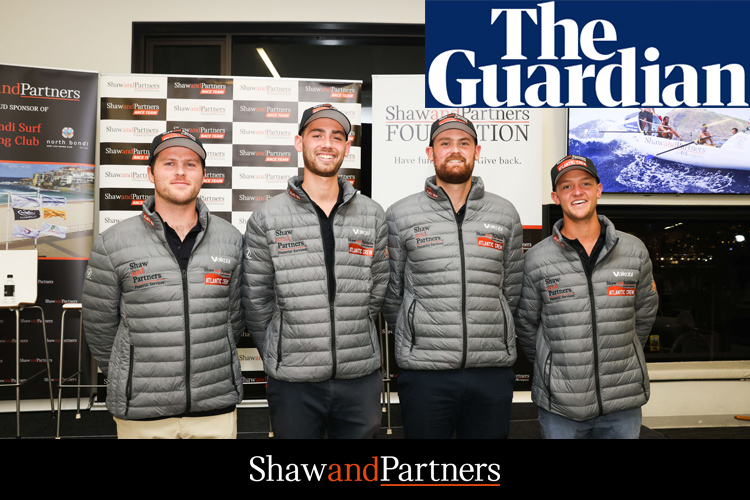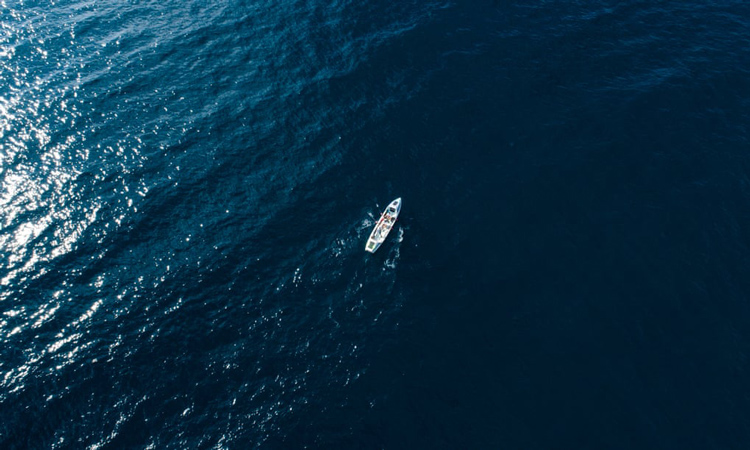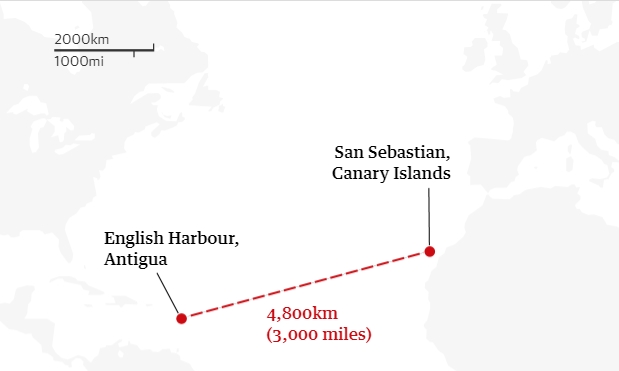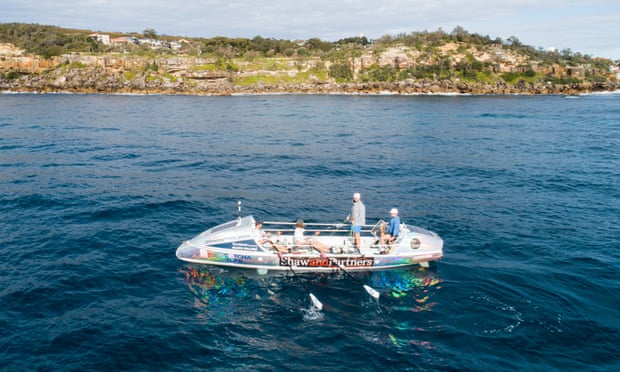
With 440 chocolate bars and a month’s worth of podcasts, the Australian crew will attempt a 5,000km voyage in record time.
Like most crazy ideas, this one started in a pub. In high school, competitive rowers Sam Horsley and Rob Wells had come across video footage from the Talisker Whisky Atlantic Challenge – an annual rowing race across the Atlantic, from La Gomera in the Canary Islands to Antigua in the Caribbean. Years later, over a few drinks, Horsley had a proposal for Wells and fellow school friends Louis Hugh-Jones and James Samuels: the group should enter the gruelling race.
At first, they thought he was joking. “And then a few weeks later he brought it up again,” recalls Wells. “At the pub, again. He said: ‘No, I’m serious, let’s look at this, let’s commit.’ After a few more weeks passed, we thought: ‘Let’s do it.’ What started out as some pub chat quickly became more serious.”

The Shaw and Partners Atlantic Crew, of Sam Horsley, James Samuels, Rob Wells and Louis Hugh-Jones, train in Sydney ahead of the Talisker Whisky Atlantic Challenge, a 5,00km race across the Atlantic Ocean.
So serious that on Thursday the Sydney quartet, now all in their mid-20s, flew to London en route to the Canary Islands. In two weeks’ time, they will begin rowing across the Atlantic –an epic 5,000km voyage. The group will take turns rowing in pairs, for two hours at a time, 24 hours a day. They hope to reach English Harbour in Antigua in just over a month, as they aim to break the Australian record of 34 days, 10 hours and 46 minutes.
One factor that helped Horsley persuade the group was their ability to use the crossing to make a difference. “We thought this would be a life-changing thing to do,” says Wells. “And we could really make money for a good cause at the same time.” Accordingly, the crew are fundraising for mental health charity Gotcha4Life. They have already raised $150,000 towards a target of half a million dollars, including through corporate support (the team is formally named Shaw and Partners Atlantic Crew, after a major sponsor).

The crew’s route from La Gomera in the Canary Islands to Antigua in the Caribbean.
Ever since those pub discussions in early 2019, the friends have been working feverishly towards their departure. The logistics of rowing non-stop, unsupported, across the Atlantic are not for the faint-hearted. “We spoke to a number of former participants, and they all said to us that it’s 95% admin,” laughs Wells. “Getting to the start line is 95% of the battle. The actual row is the final 5%.”
First, they purchased a specialist open-water rowing boat, from an English crew that competed in an earlier edition of the race. It cost $80,000 – and they have already agreed to sell it to a group of future competitors. The boat comes with solar panels and desalinating machines that allow them to drink sea water. Then they had to buy everything they would need for more than a month at sea, and ensure it would fit in the nine-metre vessel.
“We’ve packed one and a half million calories of food into the boat,” Wells explains. While at sea, the crew will eat three main meals of rehydrated ration packs each day, and snack liberally. “I think in total we have 440 chocolate bars, 22kg of nuts, 20kg of dried fruit,” he continues. “It took us weekends and weekends to clear out Aldi and Coles of chocolate bars.” Despite all those calories, competitors typically lose up to one-fifth of their body weight during the race – which, for Wells, would be 20 kilograms.
Another key element of preparation has been downloading music and podcasts to keep the crew occupied during long days and nights at sea. Wells has been busily crowdsourcing playlist recommendations from friends and family (they can recharge their devices from the solar panels, but have to pre-download everything before departing). “I think we’ll try and vary it as much as we can,” says Wells of the crew’s musical preferences. “Variety is going to be the spice of life out there when you’re looking at nothing but blue water and blue sky all day.”
The Atlantic can be a wild place. In a bad storm, the swell can build to peaks more than 10m tall. For most of the crossing, the crew will be a long way from land – and support. “I’m definitely going to be nervous,” says Wells. “But I trust in the process.” The race organisers require all competitors to undertake extensive safety training; crew members will be harnessed to the boat at all times and they carry with them a range of emergency equipment. “We’re taking every precaution,” he adds.

The Shaw and Partners Atlantic Crew train in Sydney. Photograph: Piers Haskard/Supplied
If conditions deteriorate significantly, the crew will stop rowing and take shelter in the small cabins at either end of the boat. They can also deploy a para-anchor, effectively an underwater parachute, that provides stability even in a heavy storm. In a worst-case scenario, race organisers can coordinate with passing tanker ships to arrange a mid-Atlantic pick-up.
Fellow Australian Cam Mostyn knows all too well the dangers of rowing across the Atlantic, having competed in 2019. After weeks of good weather, they met a tropical cyclone only days out from Antigua. “We were getting 30-, 40-foot waves, 80-90km winds,” he recalls. “We spent the better part of a day fighting not to capsize. And then at 4am, just before the changeover of a shift, a huge wave came. It just literally picked us up, broke on top of us and threw us straight into the drink.”
Fortunately, Mostyn and his teammates managed to return to the boat and battled through the storm to finish in an Australian-record time. They have been liaising with the 2021 team to ensure they are well-informed about the challenges ahead. “We love being able have a support and mentoring capacity with the guys,” he says.
Provided the Shaw and Partners crew can navigate any capsizes or other mid-trip incidents, they are expected to arrive in Antigua in mid-January. They will be racing against 35 other crews – a mix of singles, doubles, triples and quads. “We’re hoping to win,” says Wells. But while winning is the aim, the group have agreed that making it to Antigua with friendships intact is the main priority.
The Shaw and Partners Atlantic Crew, of Sam Horsley, James Samuels, Rob Wells and Louis Hugh-Jones. Photograph: Piers Haskard/Supplied
“It’s not just a physical task, but trying to get on with three blokes – who, in fairness, are my best mates – for 40-odd days, that might be pretty testing,” says Wells. “So we’ve said mateship has to take priority over field position.” The crew has been consulting a sports psychologist to aid their mental preparations.
Waiting in Antigua at the finish line will be the crew’s families and partners. Or at least, that’s the plan. Coordinating international travel with an uncertain arrival time has been a challenge. Because their progress is so weather-dependent, they could finish within a month – or take a full two. Wells’s partner has booked flights assuming the crew will arrive on the 35th day of competition. “If we smash the record, she’ll arrive a few days later to find me sitting by the pool sipping on a piña colada,” he says.
After a celebratory drink or three, the Sydney-based quartet will begin the long road to recovery. Mostyn’s team found that they were mostly healed within a few days, but full recovery took its time. “They told us that the last 5% took another couple of months,” says Wells. “For months they literally had to pry their fingers open – because you’ve spent half of your time just holding an oar non-stop.” Horsley and Hugh-Jones will return to their jobs as corporate consultants, Samuels, a builder, will head back to the construction site, and Wells – who has just finished his medical degree – will commence his career as a doctor.
Ultimately, the crew are hoping to return home with the experience of a lifetime – and a new Australian record. Mostyn, the current holder, says his former team will bear no hard feelings if Wells’s crew are successful. “We’ve been happy to have had the record while we did,” he says. “But records are made to be broken.”
Article source: https://www.theguardian.com/sport/2021/nov/27/it-started-out-as-pub-chat-four-men-in-a-row-boat-target-atlantic-crossing